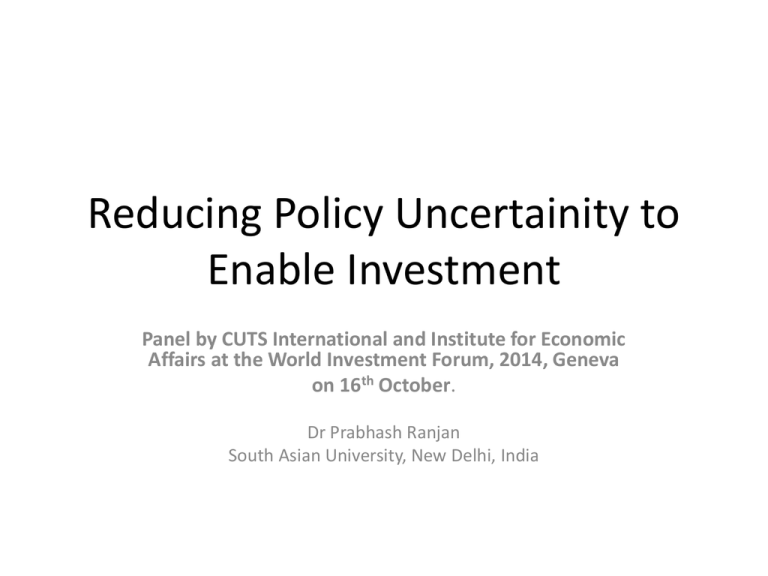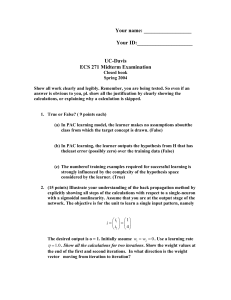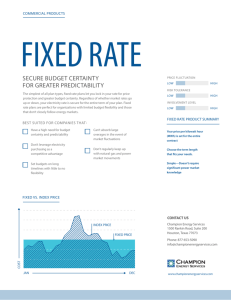Reducing Policy Uncertainity to Revive Investment
advertisement

Reducing Policy Uncertainity to Enable Investment Panel by CUTS International and Institute for Economic Affairs at the World Investment Forum, 2014, Geneva on 16th October. Dr Prabhash Ranjan South Asian University, New Delhi, India Significance of Policy certainty • Policy certainty is crucial to investment flows – sudden policy upheavals deter foreign investors. • Policy certainty includes within its ambit both – policy certainty at domestic level i.e. instruments regulating investment at the domestic level; and policy certainty at the international level i.e. instruments regulating foreign investment at the international level. Uncertainity Impeding Investment? • Empirically, it has been found that policy-related uncertainity is negatively related to firm and industry level investment. • UNCTAD’S World Investment Report (2013) noted that policy uncertainity in areas crucial for investor confidence might lead to decline in FDI inflows. • Evidence from India, on causes of low gross fixed capital formation in 2012-13, suggests that heightened uncertainty and deteriorating business confidence have played a key role in the recent investment slowdown. Why Uncertainity Impedes Investment? • High uncertainty gives firms an incentive to delay investment and hiring. • Uncertainty raises the transaction and adjustment costs associated with investments – (Retrospective imposition of taxation) • Presence of uncertainty and given the irreversibility of investment decisions, investors may choose to forego or delay investment to avoid bearing the cost of investing in the wrong activity – Example of FDI in Multi-Brand Retail in India. Causes for Policy Uncertainity at Domestic Level • Lack of Transparency in rules and procedures – such as granting environmental on ad-hoc basis. • Change of government/political differences between major political parties can give rise to policy uncertainity (FDI in multi-brand retail in India). • Policy-confusion on allotment of natural or state resources, which are later challenged in Courts leading to long-litigation and eventual termination or cancellation of licenses (telecom spectrum, coal blocks etc) Contd • Role of Judiciary – overly activist approach such as enforcement of international commercial arbitral awards or foreign awards domestically (White Industries arbitral award against Indian Public sector company Coal India). • Lack of clarity and understanding on how international instruments regulating foreign investment impact domestic economy • Lack of coordination between different government departments/ministries on major policy issues (such as policy on Bilateral Investment Treaties). Policy Uncertainty at International Levels • Most important regulatory tool impact foreign investment regulation at the international level are BITs and investment chapters in Plurilateral Trade Agreements. • Currently we are witnessing a backlash against the BIT regime, which has added to the policy chaos. • Examples of this backlash – Some Latin American states and countries like South Africa have denunciated their BITs. Contd. • Denunciating BITs implies that foreign investors will not be able to rely on treaty protection to safeguard their investment • Reliance on local judiciary is not an attractive proposition for many foreign investors • Suggestions not to accept investor-state dispute settlement mechanism in BITs – also creates uncertainty in minds of foreign investors Conclusion – how to overcome policy uncertainity? • Overcoming policy uncertainity will require different approaches and methods in different countries. • Overall, forging a political consensus on core economic policy issues at the domestic level, in every country, is very important. • Need to have clearer, transparent rules dealing with foreign/private investment. • Need to cut-down red-tape and repeal archaic laws that are not needed any more. Contd • Need to re-define the role of judiciary, curb the overly-expansionist zeal and undue-interference in policy-making, which is the domain of the Executive. • Need to evolve a clear policy on international instruments such as BITs, investor-state dispute settlement and linkages between different investment treaties (such as BITs and investment chapters in free trade agreements).








